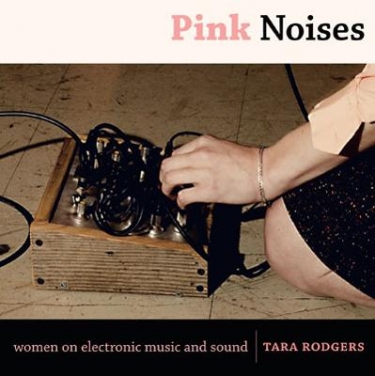
Tara Rodgers, a.k.a. Analog Tara, remarks in her introduction to Pink Noises, that the world finds it all too possible to assemble “a historical narrative of electronic music” along “patrilineal” lines, where the best that a female working in the field could expect would be a summation as “a woman in a man’s world.”
Pink Noises is a collection of interviews with female electronic musicians ranging from Pauline Oliveros, who began creating electronic works circa 1966, to the trio Le Tigre, who began releasing music in the last year of the last century. Rodgers wants to fill the reader in on anything and everything s/he’s missed. The book forms, metaphorically, a cybernetic hand pointing to the overlooked mother lode.
Rodgers lays down plenty of feminist theory. It is a measure of her scope and her interviewing skills that you don’t have to pick up on all of it to enjoy Pink Noises. It is a measure of her erudition that picking up on it enriches the study and plumbs the interconnectedness of these women across decades, devices, and attitudes.
Either way, the women’s stories speak for themselves. “I’ve had to bang my head against a wall,” Oliveros relates, “to raise consciousness.” Drummer and drum programmer Ikue Mori relates the practical side of drum computers—she can use them with headphones in her apartment. “It’s very hard to keep up,” admits Riz Maslen about current technology, “because you know how fast technology moves now.” Le Tigre’s Kathleen Hanna complains about techo-slummers: “[T]hey’re like, ‘Yeah, I was recording my five-thousand-dollar computer being unplugged over and over, and then making a loop out of it,’ . . . And [we’re] like, ‘We have crackling noises on our record ’cause we were using 8-bit samples!’”
The only substantial criticism I can give of this crucial work is that Laurie Anderson—praised by Le Tigre and others in the interviews—doesn’t get her own interview. Otherwise, Pink Noises stands ready to open ears and enrich the system.


